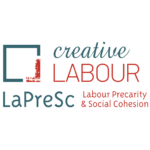Results/dissemination
LABOUR PRECARIOUSNESS IN UNCERTAIN TIMES: WORKERS IN THE CULTURAL AND CREATIVE INDUSTRIES (CCI)
Panel at the 2nd International Conference of the Association of Social Anthropologists Greece, Thessaloniki, May 24-26, 2024
Work in CCI is characterised by excessive flexibility, as self-employment, freelancing, part-time work, intermittent work, intentional or enforced multi-employment (in other artistic/creative or non-artistic activities) are the dominant forms of its organisation. These forms of flexible employment entail the uncertainty and precariousness of working conditions in CCIs, which are further exacerbated in periods of successive crises, such as the most recent ones. Using the case of the artistic and creative work, which is considered as archetypal of processes happening in the realm of work more generally in contemporary capitalism, the panel aspires to open up a field of research that remains extremely limited in the Greek context: the critical investigation of the experience and practice of labour uncertainty and precariousness in CCI in its multiplicity. At the same time, it aspires to highlight issues related to the broader transformations of work in the highly unregulated work environments of the neoliberal reality, their consequences on social practices, habits and relationships, as well as the potential of workers in the CCIs for collective protection, action and representation. In this light, we invite scholars, who utilize anthropological thinking and/or ethnography – in combination with qualitative research methods from related fields – to: a) investigate employment conditions in the CCIs as shaped by recent successive crises, b) focus on relevant policies and modes of governance, c) analyze the ways in which different characteristics (gender, class, gender, race, etc. etc.) shape workers’ conditions and affect their vulnerability. At the same time, the panel aspires to document and highlight new interconnections and modes of resistance, individual and collective practices adopted by workers and workers’ representatives in the face of challenges (e.g. platformisation) and inequalities encountered in the field, as well as potential new forms of political participation and governance emerging on this horizon of uncertainty.
For more information about the panel here, about the Conference here.
